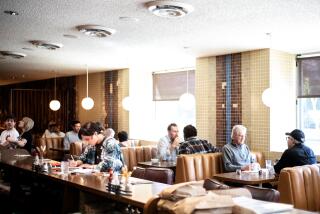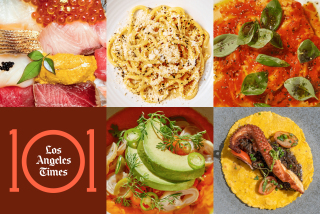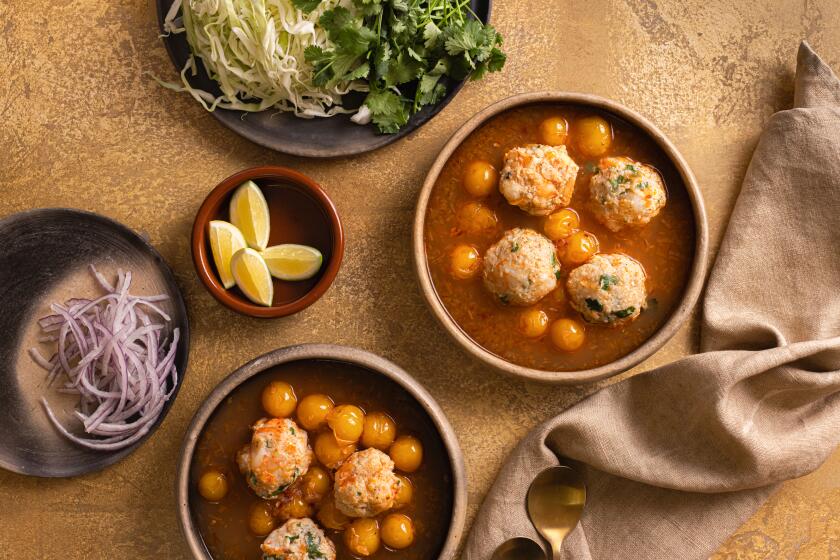A heady bouquet of change
NTSIKI Biyela looked curiously at the red liquid in her glass, wondering what to expect.
She was listening to a connoisseur who swirled his glass about, passionately extolling the perfumes of blackberries and cigar box that she was supposed to be appreciating.
Biyela smelled, as instructed, but there had never been any blackberries or cigar boxes in the Zulu village where she grew up, fetching water from the river and firewood from the forest every day. The liquid smelled alien.
Then it was time to taste. Bitter! Disgusting! Was she going to dedicate her life to making this undrinkable brew?
That was eight years ago. Today, Biyela, a petite woman with a ready smile, gets a faraway look in her eye when she has her nose in a wineglass. She is South Africa’s first black female winemaker in an overwhelmingly white, male-dominated industry. In 1999, she was one of a group of students given scholarships to learn winemaking as part of an affirmative action measure in a country struggling to overcome the poisonous legacy of apartheid.
Fresh from university in 2004, she joined the boutique Stellakaya winery here in the Cape Winelands as its winemaker, and its wines since have won gold and silver medals in South Africa, one of the world’s new wine powers.
“This is my favorite,” the 29-year-old enthused, popping the cork from a bottle of blended Sangiovese, Merlot and Cabernet Sauvignon, pouring it into a glass and holding it under her nose, with a small frown of intense concentration.
“It’s this earthiness, walking out into the forest after rain,” she said. “That’s what I am getting. I used to go and fetch firewood from the forest, and sometimes it’s like it’s been raining on a sunny day and you get this overwhelming earthiness coming out.”
Biyela has much to prove to her skeptical peers: The unspoken attitude among many winemakers -- and drinkers -- is that black people cannot make decent wine because it is not part of their cultural tradition.
In villages such as her hometown, Kwavuthela, people drink homemade beer. In black townships, people visit shebeens (taverns) drinking mainly beer and hard liquor. At the Jo’burg Wine Show in Johannesburg in June, there were few nonwhite faces among the tasters and drinkers, let alone behind the stalls.
“I was not particularly looking for a black winemaker. I was looking for someone who was capable,” said winemaker David Lello, the owner of Stellakaya winery.
“I think there are prejudices all over. Number one, she’s a woman. Number two, she’s black,” he said of Biyela. “I definitely think there are barriers, but we are not scared of those barriers. Not her, not I.”
BIYELA admitting being scared when Lello told her she would be the sole winemaker at Stellakaya, not someone’s deputy.
“He just believed in me,” she said. Although Stellakaya is small, producing 87,000 bottles a year, its wines are distributed in California and parts of Europe.
The first steps to black empowerment in South Africa’s wine industry occurred thousands of miles away in New York: at Acker Merrall & Condit, America’s oldest wine store.
In 1978, during the apartheid era, a young teetotaler named Jabulani Ntshangase left South Africa to study business in New York, earning money as a packer in the storeroom at Acker Merrall & Condit.
Ntshangase went on to become one of the country’s first black wine producers and helped found the South African Airways Wine Education Trust to educate disadvantaged students in viticulture (grape growing) and oenology (winemaking). He was the connoisseur who introduced Biyela to wine, swirling the liquid and explaining its qualities.
At Acker Merrall & Condit, Ntshangase, too, had listened with perplexity to the wine merchants extolling their products’ virtues, calling a liquid “dry.”
“At first I thought I wasn’t hearing them properly,” he said. “The second thing was this guy opening up this wine, pouring it so beautifully into a glass and looking at it and saying, ‘Wow, this thing has got some legs.’ It was the way they were describing the wines which really caught me.
“It didn’t take me long. I said, ‘I want to be a part of this.’ ”
Back in South Africa, after the end of apartheid and the start of free elections in 1994, Ntshangase and others started the wine education trust to try to introduce more blacks into the industry.
“I set off to go around high schools. I was talking to these kids aged 14 to 18, just telling them about a whole new occupation that was out there: viticulture and oenology. Their schoolteachers didn’t even know what viticulture and oenology was.”
Biyela had dreamed of being an engineer, but took her teachers’ advice and filled out an application form for a winemaking scholarship. At the time she thought wine was like a fizzy cider drink, but it did not seem to matter much. As the child of poor parents with no money for university fees, it would not really have mattered what course she got into.
If there was a scholarship, she said, “I was going to take it.”
Biyela is one of about 20 black winemakers who have graduated; 10 more are studying through the trust, Ntshangase said. The program is partly sponsored by South African Airways, but also involves a small levy on producers bidding to have their wines used by the airline.
When Biyela left home to study winemaking, she felt as if she had been torn out of her universe.
When she put up a photograph in her room of herself wearing her traditional Zulu costume, with bare breasts, fellow students told her it was not decent.
The lectures were in Afrikaans, a language she barely understood. She had to put in hours of work afterward just to discover what had been said.
“It was coming from my world into another world. That’s how it felt,” she said. “There were no white people in the village. At Stellenbosch University at that point, there were so few black people on the campus. It was a culture shock. Everything was a shock.
“I’d call my mother and sisters and say, ‘I’m fine, everything is fine.’ I’d call my cousin and burst into tears.”
But she worked hard to educate her palate. She prowled the shelves of supermarkets in search of unfamiliar smells, sniffing different fruits and spices she hadn’t tasted.
“When I got into a shop I would see something I’d heard of and just smell it and smell it,” she said. “I would smell any fruit that I would see.”
Biyela found that her palate grew exponentially when, while still a student, she worked in the acclaimed Delheim winery, renowned for its flagship Grand Reserve Cabernet Sauvignon. She no longer had to pretend to like what she was helping to make.
“When I was working at Delheim, I started drinking wine and enjoying it,” she said, adding that winemaker Philip Costandius spent hours explaining the qualities of his wines to students. “He really did inspire me. When we finished at the end of the day, you could take an open bottle.
“When I was working, [the passion] just grew in me.”
Costandius did not cut her any slack, and she was expected to do any job asked of her.
“He got into a tank and started emptying it. He said, ‘There’s your tank. You’re supposed to empty it.’ It was a big tank and I had to get inside and take the skins out. He said as a winemaker you really need to do the physical work so that when you ask someone to do something, you know exactly what it is you are asking them to do.”
STELLAKAYA buys the grapes to make its wines. At harvest time, Biyela visits suppliers’ vineyards to make sure the fruit is ready for harvest, then supervises the destalking, sorting, crushing and cold soaking of the grapes with their skins to extract the color and flavor.
Next, the grapes are stomped: In times past, this was done by human feet, but in this small winery they use wooden blocks attached to sticks. The smell at this stage is of sweet grape juice, without the heady bouquet that will come later.
Biyela has to “inoculate” the wine with the correct dose of yeast to start fermentation, turning sugar into alcohol. She measures the sugar level to check the speed of fermentation before the wine goes into a basket press and into barrels for a second fermentation in which bacteria is added.
Weeks or months pass before the wine is “racked” -- removed from the lees, or sediment -- and placed into clean barrels, with other additions.
Biyela’s favorite moment is blending: All the different wines that have been made are tasted, and she blends them to produce a particular wine.
“There is more art involved in blending,” she said. “You are tasting the wine and you are trying to put different components with different characters together. You want them to be harmonious. It’s hard work. But it’s also fun.”
Last year, Lello sent Biyela to Saint-Emilion, the famous winemaking area of Bordeaux, France. There were more adventures for her palate, but she came back with her belief in the quality of South African wines affirmed.
“Yes, they make good wines. But I believe in our South African wines,” she said.
One of Biyela’s fans is Philippe Wagenfuhrer, a French chef at Roots restaurant, near Johannesburg, who believes her wines have grown in elegance and style as she has gained confidence and independence as a winemaker.
“Hercules was different,” he said of the silver-medal Sangiovese blend. “Hercules was the wine that stood out of the whole range. It’s the one that was my favorite. It’s soft yet complex. You can tell it’s made by a woman. It’s a wine with elegance and finesse.
“When you give freedom to passion and freedom to people who know what they want to do, they excel themselves,” he said. “She’s now getting big comments on the quality of the wine and she’s really doing very well.”
Sometimes at night, Biyela lies in bed thinking of her wines in their barrels of French oak in the cellar. She worries whether they are all right and thinks of them as her “babies” tucked in for the night. She dreams of one day having her own vineyard and cellar.
“I want someone to taste the wine and say, ‘I love this.’ That makes me feel good, because I made it.”
Now when she goes back to Kwavuthela village, her mother, proud of Biyela’s achievements, pulls out a bottle of wine and pours out glasses.
As they drink, Biyela catches in her mother’s face a glimpse of the same incomprehension she once felt herself. She smiles secretly to herself.
More to Read
Eat your way across L.A.
Get our weekly Tasting Notes newsletter for reviews, news and more.
You may occasionally receive promotional content from the Los Angeles Times.






